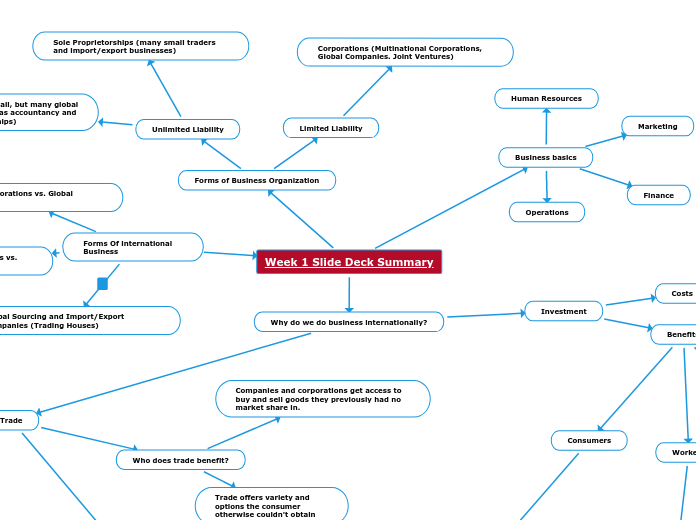James
Ali
Ethon
Zakariya
Forms Of international Business
Multinational Corporations vs. Global Companies
Global Sourcing and Import/Export Companies (Trading Houses)
Joint Ventures vs. Strategic Alliances vs. Wholly-Owned Subsidiaries
Week 1 Slide Deck Summary
Forms of Business Organization
Limited Liability
Corporations (Multinational Corporations, Global Companies. Joint Ventures)
Unlimited Liability
Sole Proprietorships (many small traders and import/export businesses)
Partnerships (mainly small, but many global service companies such as accountancy and legal firms are partnerships)
Business basics
Human Resources
Marketing
Finance
Operations
Why do we do business internationally?
Investment
Costs
1. Adapt. Study what makes the products on offer from foreign competitors attractive, and what technological and managerial secrets allow them to use resources more efficiently and make the necessary changes yourself.
2.Focus. Which of your existing products are competitive in this new environment? What products should be abandoned?
1. The dislocation and changes brought about by international business, as some firms expand and hire while others shrink and fire, should cause government to offer support to those who have lost their businesses or jobs.
2. Greater interdependence may constrain the government’s ability to act in the national interest. Trade agreements may even demand that foreign companies be compensated when, say, environmental laws hurt profits.
Rising foreign demand of certain products can cause their prices to rise making it too expensive for consumers.
1. As firms go, so too go workers. If foreign goods are more attractive (i.e. cheaper or better or both) than domestically-produced goods, firms will be driven out of business and workers at those firms will lose their jobs.
Benefits
Government
1. Both increase domestic income, and hence domestic income tax collection. Anything that makes workers and firms richer makes the government richer.
2. If trade is taxed through tariffs and duties, increased trade directly increases government tax revenue
3. Greater commercial links lead to greater interdependence and international cooperation, which make calamities like war less likely.
4. Foreign trade, and especially foreign investment, puts pressure on firms and government to be more efficient to offer an agreeable business climate for firms who do have choices about where to operate.
Consumers
1. Increase consumer choice. Foreign goods and services offer alternatives to domestic products.
2. Increase the quantity and quality of products available for sale. Whether the goods are made abroad or made in foreign-owned factories in your country doesn’t really matter.
3. This increased competition from foreign goods should reduce prices for consumers as well.
Firms
1. Trade and investment from foreign countries create opportunities for workers
2. Trade and investment from Canada abroad also create opportunities for Canadian workers. Canadian exports need to be produced by workers and Canadian investment abroad generally involves Canadians moving abroad to work.
Workers
1. Greater sales and profits from selling into foreign markets, or from making investments abroad to either produce and/or distribute goods and services abroad or to produce them for sale back in the domestic market.
2. Greater access to current technology and managerial practices that might be introduced into the country by foreign firms or brought home by domestic firms operating in foreign countries.
3. Being a part of global supply chains which may allow for rationalization of production.
Trade
Who does trade benefit?
Companies and corporations get access to buy and sell goods they previously had no market share in.
Trade offers variety and options the consumer otherwise couldn't obtain
Why do we trade?
Comparative Advantage
Competitive Advantage
Absolute Advantage
Absense
The logic of foreign trade is the same logic that drives trade within a town. Trade makes everyone better off. If I have something that you value more than I do, while you have something that I value more than you do, of course we should do a swap, which will make us both happier.









